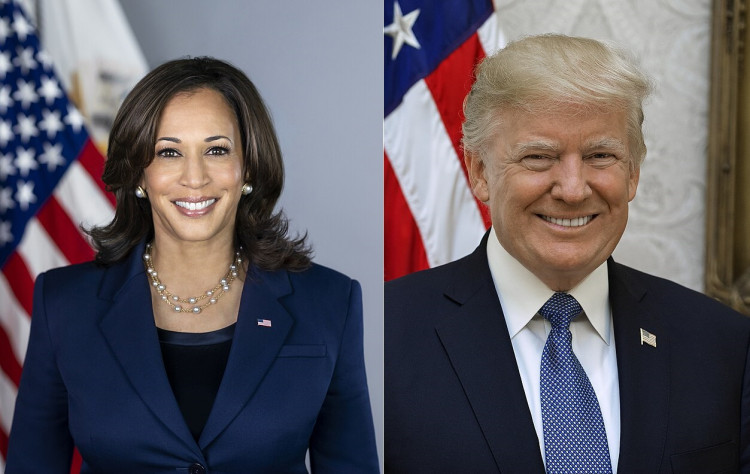Vice President Kamala Harris has launched a scathing attack on former President Donald Trump following revelations in Bob Woodward's upcoming book, "War," that Trump allegedly maintained contact with Russian President Vladimir Putin after leaving office and secretly sent COVID-19 test machines for Putin's personal use during the pandemic. The claims have stirred controversy as Trump campaigns for a potential return to the White House in the 2024 election, raising questions about his ties with a key U.S. adversary.
According to Woodward's book, which is set to be released on October 15, Trump and Putin engaged in as many as seven private phone calls since Trump's exit from the Oval Office in 2021. The book recounts an incident where Trump reportedly told a senior aide to leave the room so he could have a confidential conversation with Putin at his Mar-a-Lago estate in Florida. The claims have reignited debates over Trump's relationship with the Russian leader, a bond that has drawn criticism throughout his political career.
Harris did not hold back her criticism in a recent interview with Howard Stern on SiriusXM, where she accused Trump of prioritizing an adversary over the American people during a time of crisis. "This person who wants to be president again, who secretly is helping out an adversary while the American people are dying by the hundreds every day," she said. Harris described Trump's alleged actions as a stark betrayal, especially given the struggles Americans faced in accessing COVID-19 testing during the pandemic's peak.
Harris went on to accuse Trump of being manipulated by authoritarian leaders like Putin, suggesting that his admiration for strongmen blinded him to the national interest. "He admires strongmen and he gets played by them because he thinks that they're his friends," she said. "They are manipulating him full time and manipulating him by flattery and with favor." Her comments reflect a broader criticism that Trump's diplomatic style often led to him favoring relationships with autocratic figures.
The allegations outlined in Woodward's book also describe a situation where Trump secretly shipped COVID-19 test kits to Putin, despite widespread shortages in the U.S. at the time. According to the book, Putin requested that Trump keep the transaction confidential, fearing backlash, to which Trump allegedly replied that he didn't care if anyone knew. This revelation has provoked strong reactions from political leaders and national security experts, who argue that such actions are not only inappropriate but also undermine U.S. interests.
Trump's campaign has aggressively denied Woodward's claims, dismissing them as fabrications. Steven Cheung, Trump's communications director, responded with a vehement statement, calling Woodward a "demented and deranged man" and labeling the book's allegations as baseless. "None of these made up stories by Bob Woodward are true," Cheung stated, accusing the journalist of suffering from a "debilitating case of Trump Derangement Syndrome."
Trump's running mate, Senator J.D. Vance, also weighed in on the controversy, downplaying the significance of the alleged communications with Putin. Vance defended the idea of diplomatic engagement, saying, "Even if it's true, look, is there something wrong with speaking to world leaders? No. Is there anything wrong with engaging in diplomacy?" He criticized Harris's foreign policy approach, suggesting that her lack of visibility on the global stage has led the U.S. to the brink of international conflicts.
Bob Woodward's book paints a picture of Trump's continued fascination with authoritarian figures even after leaving the White House. The revelations in "War" include details of Trump's interactions with Putin during the COVID-19 pandemic, specifically the delivery of test kits to Russia, which has been described as a questionable act of favoritism toward a geopolitical rival. The book implies that Trump's actions were aimed at maintaining favor with Putin rather than advancing U.S. strategic interests.
Woodward's reporting has drawn scrutiny not only for the allegations it makes but also for the broader implications regarding Trump's foreign policy strategy. National security expert Rolf Mowatt-Larssen criticized Trump's continued contact with Putin, calling it "totally inappropriate" given Russia's ongoing conflict with Ukraine. "Just the idea of him calling Putin, even if it's just a social call, undermines U.S. policy by talking to a leader of a country that is at war with an ally that we are supporting militarily and financially," he said.
The new claims in Woodward's book come as Trump remains a central figure in the 2024 presidential race, where his foreign policy actions and ties to leaders like Putin are sure to be focal points. His decision to send COVID-19 test kits to Russia, if proven true, could further complicate his political narrative as he seeks to convince voters of his ability to handle complex international relationships. Meanwhile, the Biden administration continues to criticize Trump's perceived alignment with autocratic regimes, positioning itself as a staunch defender of democratic principles.






